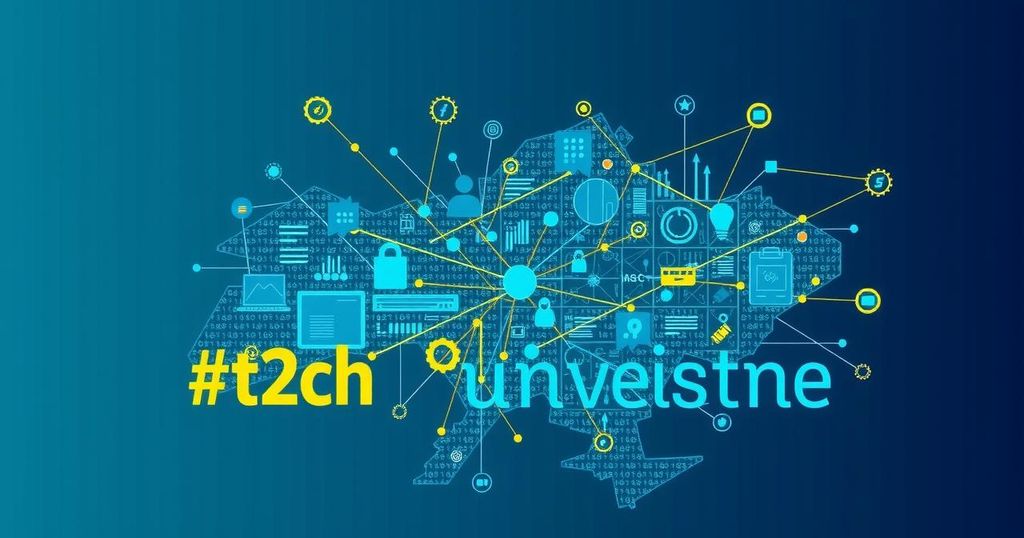Ukraine’s tech sector, particularly in defense, shows sustained growth despite challenges from ongoing conflict. With impressive annual growth rates and increasing investments from European nations, Ukraine is solidifying its role as a vital player in Europe’s security landscape. Ukraine’s abundant resources and skilled workforce further enhance its potential as a key technology provider, ensuring significant contributions to global supply chains and defense capabilities moving forward.
The recent trends in Ukraine’s technology sector, particularly in defense and dual-use technologies, reveal a strong and resilient growth trajectory that is expected to continue well into 2025 and beyond. Regardless of political fluctuations in the U.S., Ukraine has established itself as a central player in Europe’s security and innovation landscapes, demonstrating consistent resistance against the challenges posed by ongoing conflict. Since 2017, the country’s startups have maintained an impressive annual growth rate of 25%, and this trend is anticipated to strengthen further.
Ukraine’s reputation is cemented as a vital contributor to European defense innovation, especially given that a Ukrainian company has recently entered the ranks of the top global defense manufacturers, a notable milestone that underscores Ukraine’s emergence as a significant player in this domain. The urgency brought forth by Russia’s aggression has compelled Europe to prioritize defense autonomy, resulting in record-high defense budgets within NATO, which saw an 8% increase in 2022, totaling €240 billion. The ascension of NATO members meeting spending targets, rising from six to twenty-three, reinforces the commitment to achieving self-sufficiency in defense resources and validates significant investments in Ukraine’s technology sector.
European leaders now recognize the strategic necessity and cost-effectiveness of supporting Ukraine during this critical juncture, viewing it as an indispensable ally within their defense infrastructures. This relationship is expected to drive heightened investment into Ukrainian technological advancements, as the nation’s innovation, expertise, and solutions become increasingly vital for Europe’s security and technological future.
The level of Ukrainian innovation in defense technologies is noteworthy, with fast-tracked developments in dual-use solutions that are combat-tested and scalable. The emergence of over 1,200 innovative enterprises since the invasion has resulted in significant contributions to Ukrainian defense efforts, echoing the trajectory of Israel in the 1990s when it transformed into a leading ‘Startup Nation’. These conditions have facilitated a robust tech ecosystem addressing pressing defense needs while positioning Ukraine as a key technology provider to Western nations.
In addition to advancements in defense technology, Ukraine boasts substantial reserves of critical raw materials essential for global supply chains, including lithium, titanium, graphite, manganese, and numerous rare earth metals. As a top producer of titanium and manganese, and with one-fifth of the world’s graphite reserves, Ukraine plays a pivotal role in the aerospace, defense, and technology sectors. It is also a major supplier of neon used in semiconductor manufacturing, which further establishes its importance in the global tech landscape. However, the ongoing conflict has placed a significant amount of these resources under Russian control, jeopardizing Ukraine’s economic potential and disrupting global supply chains that depend on these vital materials.
Moreover, Ukraine’s educated workforce, particularly in STEM fields, enhances its technological capacities, with over 300,000 professionals available and a growing talent pool expected to surpass that of Israel by 2028. This robust human capital is crucial for advancing dual-use technologies and ensuring that Ukraine retains its leadership position in defense tech innovation. Post-conflict scenarios, while complex, suggest that Ukraine is unlikely to lose its sovereignty, and efforts will focus on negotiating territorial disputes while ensuring that the country can independently fulfill its defense needs.
Russia’s economic challenges, exacerbated by the war and international sanctions, further illustrate the stark differences between the two nations’ capabilities. With substantial demands for innovative defense solutions coinciding with Ukraine’s significant technological investments, the outlook for economic returns from Ukraine’s tech sector appears promising. Ultimately, a stable and sovereign Ukraine is instrumental for fostering European security, enhancing market stability, and driving growth opportunities across the region.
The article outlines the potential of Ukraine’s technology sector, especially in defense and dual-use innovations, as the country continues its path of growth amidst ongoing conflict. It highlights Ukraine’s established position in Europe’s security framework, the increasing European defense budgets, and the strategic importance of Ukrainian materials and innovations to global supply chains. The narrative reflects on both the nation’s challenges due to Russian occupation and its burgeoning prospects fueled by technological advancements and a skilled workforce.
In conclusion, Ukraine’s technology sector, particularly in defense innovation, is poised for significant growth despite the ongoing war with Russia. The strategic importance of its resources and technological advancements, combined with a strong workforce, secures Ukraine’s role as a critical ally for Europe. With increasing investments and recognition of the need for defense autonomy, the future outlook for Ukraine’s tech industry appears exceptionally promising, contributing to both regional stability and economic prosperity.
Original Source: www.hstoday.us






